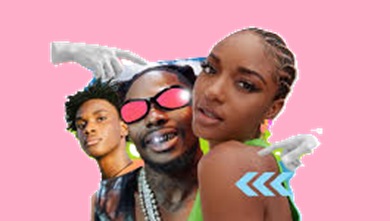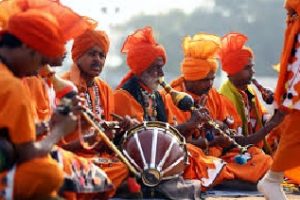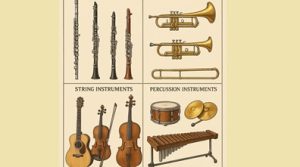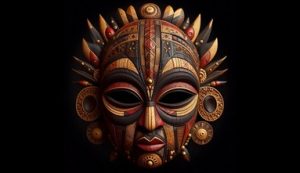Nigerian Music: Past, Present, and the Future
Nigerian Music: Past, Present, and the Future
Music is part of Nigerian culture—it’s not just about entertainment but also about who we are. According to our Creative Director, Gozi, music goes hand-in-hand with creativity and fashion.

And to step into Lagos is to see music in the city. It fills the streets, permeates every turn, and gives life to the urban beat.
Here, we’re giving you a tour of Nigerian music—from its traditional beginnings to its present worldwide popularity.
Along the way, we’ll show you video clips of poignant live performances in Jazz, Highlife, Jùjú, Afrobeat, Reggae, and Afrobeats—genres that have influenced generations and still echo across the globe.
Nigerian Music Key Takeaways:
- Nigerian traditional music served functional and ceremonial functions. Genres like Jazz, Highlife, Jùjú, Reggae, Afrobeat, and Afrobeats have very Nigerian roots and are gaining global popularity.
- Fela Kuti was pivotal to the creation of the sound that is called Afrobeat, whereby the original beats were mixed and some bits of jazz were inserted to create a sound that continues to be hugely inspirational.
- Current popular Nigerian music—usually referred to as Afrobeats or Afropop—is rooted firmly in the early sounds, but is are reinterpretation for a new generation audience.
Nigerian Music: A Brief Historical Background
To start with, Nigerian traditional music was functional. It was integrated into daily life and utilized to commemorate significant occasions like weddings, funerals, or farming.
As an illustration, in northern communal farming, the host farmer would traditionally hire live musicians. The musicians sang the praises of the host and motivated other workers with rhythm and chant.
Igbo music has served as a key component in narration, entertainment, and memory among Southeast Nigeria societies.
Obos (zithers), lutes, flutes, xylophones, lyres, slit drums, and udus (clay pot drums) constituted the foundation of what later became Nigerian Highlife.
North of the Niger River, the Hausa societies have kept the kakaki, a dazzling two-meter-long metal trumpet played on royal occasions and public announcements and showcasing an elegant musical tradition.
The instrument was originally an icon of military power and prestige, having been invented in the Songhai army and subsequently adopted by the Hausa kingdoms.
Nigerian Music Shifts and Influences: The 20th Century
As Nigeria navigated the 20th century, its music started changing. Nigerians traveled overseas and came back with new inspiration from around the globe.
These influences created local interpretations of Western genres and led to completely new styles. Music also started intersecting with politics, religion, and self-expression.
It was no longer merely functional, but a strong force of recreation and artistic expression.
The Past: Genres of Nigerian Music
Jùjú
After World War II, Tunde Nightingale introduced more Western musical elements into Jùjú through his unique S’o wa mbe style, which gained popularity among Lagos’s elite circles.
These performances often featured segments that praised distinguished guests, thereby adding layers of personal and cultural significance.
The phrase S’o wa mbe?—translated as “Is it there?”—may have alluded to the beads worn by dancers on their hips, imparting a playful double meaning to the music.
With the advent of new technology in the 1950s, Jùjú music’s sound expanded further.
Jazz: The Lagos Sound Revolution
Though their music was more traditional than Fela’s experimental approach, their performances were equally engaging. Fela’s band later developed into the legendary Koola Lobitos over time.
The club also hosted international legends such as Ginger Baker and James Brown, who jammed with Nigerian artists, sparking ongoing debates about who influenced whom more: Fela or James Brown.
Fun Fact:
Frances, affectionately called Aunty Fran, was also Gozi’s dentist and a beloved figure in the community.
Unfortunately, she died soon after the death of her cousin Fela Kuti.
Women in Jazz: Shaping the Sound
Other than other Nigerian genres, jazz had a strong presence of women.
In Port Harcourt, Maud Meyer emerged as a much-loved jazz singer, supporting the genre within Eastern Nigeria.
Her impact helped pave the way for the Port Harcourt Jazz Festival, launched in 1988 by the Port Harcourt Jazz Club.
The first three years of the festival featured the likes of Dizzy Gillespie, Oliver Jones, and Embryo to solidify jazz’s regional reputation. During the 1980s, therefore, performers like Yinka Davies made Nigerian jazz lively.
The club Jazzville in Lagos was a launching platform for future performers, bringing entertainers like Funsho Ogundipe (Yoruba singer of Ayetoro) and Bisade Ologunde (Lagbaja) to the mainstream.
Reggae: The Beachside Vibe
Reggae: Beach Life Nigeria’s love for reggae music is deep, all thanks to a pioneer by the name of Tera Kota.
Beaches became the coolest locations to soak up the genre’s relaxing rhythms and tropical vibe.
It worked, and beaches were now cool places to experience live music in Nigeria.
And then there was Bar Beach—during the day, a peaceful hideaway; at night and on weekends, a spot of energy that was full of music, food, and laughter.
Unfortunately, after continuous flooding, Bar Beach was forced to be closed to ensure everyone’s safety. But Lagos people are resilient.t
Others argue that the lyrics are more about partying, money, love, and hustle from the internet, as opposed to a lot of political commentary like in earlier genres.
However, despite that, the music has a huge international appeal. Having artists like Drake, Snoop Dogg, and Ed Sheeran has pushed Afrobeats worldwide.
Lagos becomes even more vibrant in December when Nigerians from the diaspora come back for Christmas. The city is filled with festivals during this season, with big concerts and music festivals.
And, events like Gidi Culture Festival and Skepta’s Homecoming, typically during Easter, make Nigeria’s pop scene lively.
The Now: Afrobeats and the Era of Global Pop
Afrobeats (not Afrobeat, the music Fela Kuti invented) is the dominant sound in contemporary Nigerian music.
This genre has driven a cultural trend. Nigerians listen to Afrobeats at weddings, clubs, festivals, or even just through street DJs.
To obtain the hottest songs before they become viral sensations on the internet, you visit Alaba Market, street CD sellers, or your neighborhood DJ mixing CDs.
True, some critics argue the issues—love, money, partying, and commentary on online frauds—lack the political undertones of past genres.
But denials aside, the international momentum cannot be wished away. Collaborations with global superstars such as Drake, Snoop Dogg, and Ed Sheeran have placed Afrobeats on the global map.
Lagos is particularly charged in December when Nigerians in the diaspora come back home for Christmas.
During this yuletide season, the city is a cultural melting pot, featuring prominent concerts and music festivals.
And festivals such as Gidi Culture Festival and Skepta’s Homecoming, which are usually planned around Easter, continue to keep Nigeria’s pop culture calendar alive.
The Future: Alté and the Alternative Sounds Rise
This genre-bending wave is led by experimentation specialists such as Odunsi (The Engine), Santi, and Lady Donli, who are mapping a new musical territory with experimentation and genre-bending.
Alté transcends being a sound experience—it’s a statement. It speaks of rebellion and creative freedom on the part of young Nigerians who refuse to be confined within mainstream genres.
What began as underground performances in dingy Lagos bars has evolved into a global phenomenon.
With their unique sound and radical music, Alté artists now command world attention, establishing a new course for Nigerian music abounding with originality and fearless expression.
Conclusion: The Beat Goes On
Nigerian artists continue to reinvent themselves, drawing inspiration from the country’s deep and multi-faceted musical heritage.
From their traditional rhythms to fusion sounds all over the world, music has never been anything more than entertainment; it has also been an instrument of unity, identity, and cultural change.
Over time, Nigerian music has united humanity, uniting communities with their mutual tastes and expressions. The communities then go on to renew each style, pushing boundaries and establishing the sound of every era.
At U.Mi-1, we believe in the power of the community—the same force that creates music is the beat of creativity. As we build our creative network, we invite you to join us on the ride through the ever-evolving soundscape of Nigerian music.
Press play on our expertly curated playlist and discover the heritage, energy, and innovation for yourself.
Below are some interesting facts to leave you with:
What is a fact about Nigerian music?
There are countless types of Nigeria’s folk and popular music.
While much of pre-colonial music history still has not been registered, 16th- and 17th-century bronze carvings reveal the historical predominance of music and musical instruments.





